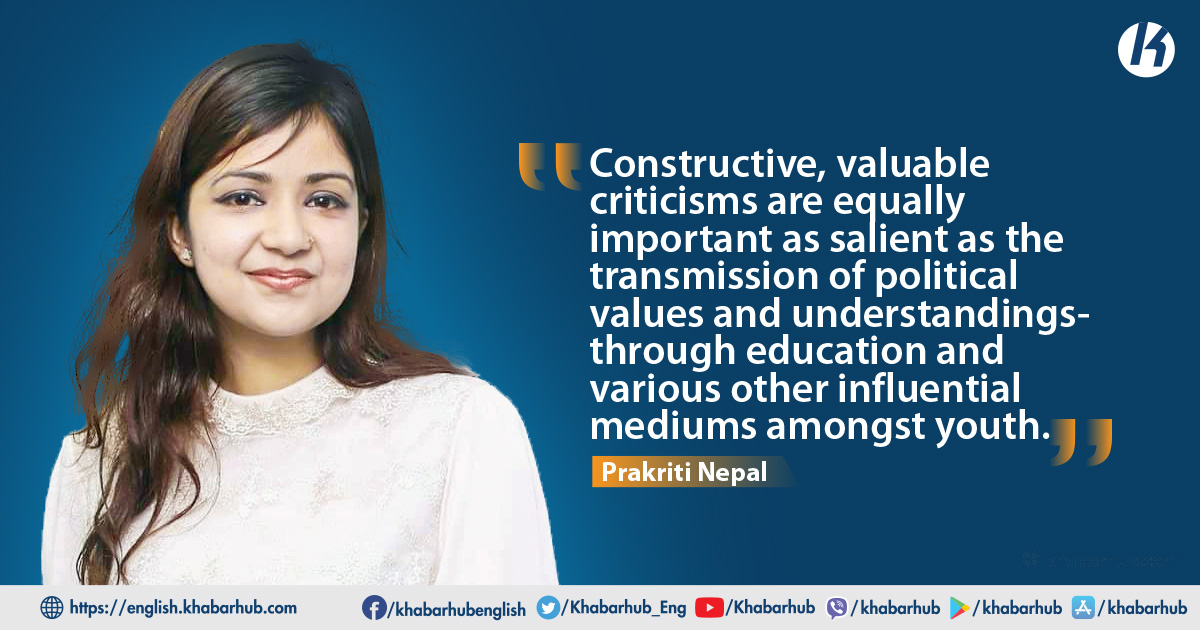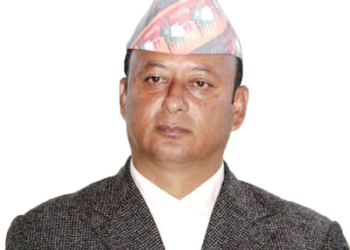How many of our youths are convinced that their thoughts, ideas, and say can influence government decisions and their voice can reach the governance level to bring positive changes in the political scenario of our nation?
If we ruminate on the current nature of youths in our country- then we can deeply understand the symbolic impact that our country can gain through youths’ involvement in politics and the uplift that a country’s political scenario can relish in the present as well as in the future.
Political empowerment and reforms can be determined by conceptualization and understanding if youths are fully convinced about their ability to create a beneficial strike in a political plot ( a youth’s desired one) – in a country like ours.
So, what is being fully convinced? How can the youth be fully convinced? Have political representatives of our nation ever given thoughts on this? Or is the idea that young people can influence Government decisions is way too abstract for the youngsters in Nepal?
In Nepal – The youth age is determined as people between 16-40 years as per National Youth Policy, 2010. As per statistia.com- about 65.36 percent of people fall into the 15-64 age group and about 5.83 percent were over 65 years of age.
Also, when we look at the past data- In the year 2011, as per the Government of Nepal Youth and Sports Ministry- The total youth population of Nepal was 54.5 percent of the female population and 45.8 percent of the male population.
As per The Legatum Prosperity Index, Nepal ranks 89th in terms of Governance in the world. Also, in keeping with the world average based on research by the global economy.com- the political stability index of Nepal is (-2.5 weak; 2.5 strong), 1996 – 2019 which means, the latest value from 2019 is -0.47 points.
An alarming percentage of the population; isn’t it? Now, let us try to understand the political efficacy among young people in Nepal.
The Concept Of Political Efficacy Among Youth
In Political Science, “Political Efficacy” is the trust that citizens have in their capacity to change their government and confidence that citizens can influence the political affairs of a country.
Politics as a subject is concentrated in history or in social studies in secondary schools. It isn’t given as much importance as it should get when children are becoming adults. Rather, it has been time and again quoted as
“Politics is a dirty game”- giving this thought/quote more power.
So, when in school- the teachers need to edify the significance of political education by tutoring about political pedagogic skills to students- just as they would consciously teach students about the importance of being educated to build an upskilled and aware human race.
The willingness to know historical events and current affairs happening in the nation needs to be instilled in students, especially in those who exhibit an interest in understanding politics.
Well! Some people, who are passionate about politics are never outspoken, whereas some who are outspoken are not really aware of the core of politics.
So, careful analysis needs to be done by teachers in schools and professors and supervisors of youngsters when they grow up – to infuse constructive political awareness.
As much as it is necessary to have differences of opinion amongst citizens, it is very important for the citizens to have the trust that they are good enough to influence political affairs.
Young people especially- need to behave politically pleasant and display a higher level of awareness about politics. Also, the political efficacy shouldn’t be much focused on inducing oneself with continuous and blind support to any sort of political system.
It is very important to have politically educated, informed and participative citizens for a country to move towards development.
Constructive, valuable criticisms are equally important as salient as the transmission of political values and understandings- through education and various other influential mediums amongst youth.
It needs to be clear that political awareness and political learning which creates political efficacy isn’t about showcasing support to political systems, processes and values.
It is more about political socialization- creating a much knowledgeable society with strategic and ethical, philosophical and scientific diaspora inducing practicality, behaviorism and growth-centric transformation contributing to the upliftment of economic standards of a nation and creating developmental political changes in the nation.
Young Politically Aware Adults- In the Context Of Nepal
As per IPU Parline- Global Data On National Parliaments- the youngest parliamentarian of Nepal is Parvati Kumari Bishunke (Female) who is 31 years old. 5.09% in the Nepalese Parliament are 40 years of age or younger, out of which 0.73% are male and 4.36% female.
Furthermore, IFES has mentioned that – more than 3 million Nepali youth will be eligible to vote if an election takes place in the year 2022. So, are our youth politically aware of the impact that being a voter can create?
When we try to ponder upon political science-educated youth, we can analyze the gap in terms of having the knowledge of politics and political knowledge implementation.
Those working in governance and government positions also need to take into consideration the young entering the labor force each year in order to understand political efficacy in youth. The International Labour Organization has mentioned that over 400,000 young people are estimated to enter the labor force every year.
It has been more than 7 decades of political science studies in Nepal and political science studies have been going through changes and diversification since then.
It was first introduced as Civics at certificate level during the 1950s and by 1960-61 it got elaborated to a postgraduate level as (MA) Master of Arts.
In Tribhuvan University, the first batch of political scientists were just 10 and the number slowly increased to 284 by the year 2003. So, there are many youths who have studied Masters in Political Science in Nepal by 2021.
Yet, has there been a citizen’s desired political soundness in Nepal? Have the knowledge and education which the youth are receiving through political science education- being implemented?
As per The Legatum Prosperity Index, Nepal ranks 89th in terms of Governance in the world. Also, in keeping with the world average based on research by the global economy.com- the political stability index of Nepal is (-2.5 weak; 2.5 strong), 1996 – 2019 which means, the latest value from 2019 is -0.47 points.
Yet, the number of youth, those who are somehow involved in politics or have political efficacy have not been concurrently calculated.
Though, in accordance with the YDI report, Nepali youth’s political participation is seen to be ranking 11. However, according to the Fragile State Index 2020 report, the ranking of Nepal in the Fragile State Index out of 178 countries is 49.
Well, in line with World Bank’s record shared by Trading Economics- Political Stability and Absence of Violence/Terrorism’s Percentile Rank in Nepal was reported at 28.57 % in 2019.
So what does this mean regarding the presence of politically aware youth in Nepal? This means that youth- be it student unions’ youth, be it civil society professional youth, be it politically aware news reading- influenced youth, be it parliamentarian youth or youth policymakers and those youth in bureaucracy- the data regarding all the types of youth need to be well collected and analyzed to sense the contribution made by youth directly or indirectly or the contribution which they can make in the present time or in future.
The capability of youth is undoubtedly the most that need to be utilized and if and when given a chance- Youth can bring radical constructive change in any dimension.
Those working in governance and government positions also need to take into consideration the young entering the labor force each year in order to understand political efficacy in youth. The International Labour Organization has mentioned that over 400,000 young people are estimated to enter the labor force every year.
This sort of data can also be utilized to get a hold of how many youths entering the labor force can opt for politics as a profession or politics as a side hustle- which can create an impact on the political stability and political soundness of the nation.
Today, if we see superficially, then we can know that a lot of youngsters are being driven towards technical education, while on the contrary- the interest in studying and mastering the arts of Political Science and becoming Political Scientists for benefiting the society and the nation and applying research and diversification in politics – for proper strategy implementation, is not abundantly being inputted- as required. Isn’t It?
The capability of youth is undoubtedly the most that need to be utilized and if and when given a chance- Youth can bring radical constructive change in any dimension.
Yet, there is a chance that due to less number of youth-driven towards practical Political Science implementation- there might not have been seen- out in the open- practical reforms in Politics – made by youth (as Political Representatives and Political Scientists) in today’s time.
Yet, we know that lots of Jana Andolan (2006 revolution, 2007 Democracy Movement, People’s Movement of 1990) were the results of massive youth participation in the past.
Henceforth, qualitative implementation of research-driven thoughts of politically aware youths need to be done, for the political stability of the nation.
Also, quality education providence should be done for the youths- for constructive political changes and diversification in a larger sense.
Can Political Efficacy Be Developed Amongst Youth?
Political Efficacy in terms of voting and protest is existent in Nepal. This is a good sign of youth citizens having self-confidence in being able to influence political processes and structures.
On the part of students and youth- active participation in Youth Councils, Youth Clubs need to be done and politically aware youth should have a thorough knowledge and written points to suggest in the Youth Vision of Nation.
Youth are also members of social clubs, discussion forums that touch upon political subjects. For example; in a journal by Brett L. M. Levy, through his questionnaire research- he has found that the political efficacy of students increases when they become active members and participants of clubs.
Still, as per another author, Tom O’Neill- in his journal titled Youth Political Engagement and Democratic Culture in Republican Nepal- has mentioned that the participation of youth in political engagement is antagonistic, as they seem to be performing as the political cadres in student unions, also in the ethnicity-based organizations and as impartial players in civil society.
Various possibilities need to be researched well to find out the awareness of youth in terms of politics and political efficacy.
For this, more education-driven participation of aware youth in politics can create desired political situations in the country.
Also, since current youth are those- that were not born during the various movements of Nepal, today’s youth have not practically seen stepwise changes in the political scenario of Nepal according to Tom O’Neill.
So, this political system, Federal Republic Nepal is new to every citizen including the youth. Therefore, the youth’s participation needs to be increased in various ways so that our youngsters start contributing to the sustainable and long-term developmental changes for Nepal.
On the part of students and youth- active participation in Youth Councils, Youth Clubs need to be done and politically aware youth should have a thorough knowledge and written points to suggest in the Youth Vision of Nation.
Thus, youth should be intelligent enough to have self political efficacy to contribute to the productive growth of Nepal. Just as Pablo Picasso has said, “ Youth has no age” and just like Pythagoras has said- “ The beginning of every Government starts with the education of our Youth”.









Comment